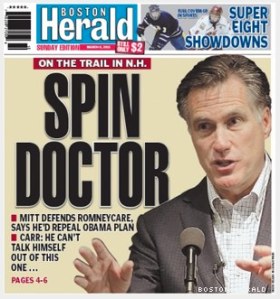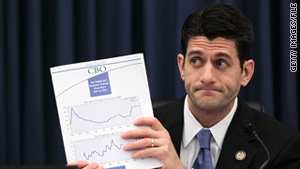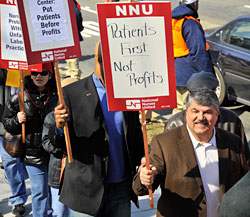
GOP Version of the ‘Pottery Barn Rule’:
‘We break it, we blame you ... and call you a Nazi.’
By Tina Dupuy
Fall River Herald News
Calling ObamaCare “socialized medicine” truly lowers the standards on what could be considered socialized medicine. It’s like calling paved roads “government overreach”; a stop light a “government takeover of your commute”; or a neighborhood with speed bumps “a road to communism.” The law is really some regulations to help consumers buy private insurance coupled with a small fee if consumers decide not to buy said insurance.
Is it perfect? No. Could it be improved? Absolutely. However, ObamaCare is the opposite of socialism — it’s a market solution.
The right-wing got a “free” market solution to health care. That was their cause — personal responsibility their mantra — now it’s law. They got an entire reform bill incentivizing citizens to buy into private for-profit insurance plans. This is the Republican vision for America: Less government more profits for giant corporations. This core of the Affordable Care Act was an idea floated by President Nixon in 1974, touted by the Heritage Foundation in 1989, introduced by Newt Gingrich in 1993 and implemented by Mitt Romney in 2005. And now? Now it’s a big festering albatross around Obama’s neck.
As former presidential candidate Michele Bachmann said in front of the Supreme Court last week, “We have not waved the white flag of surrender on socialized medicine!”
So the decades-old Republican big idea finally gets Democratic presidential ink and now, if you ask a Republican, it’s an unconstitutional government takeover of health care Stalin would have loved. Mitt Romney wants to repeal ObamaCare and replace it with RomneyCare. Essentially repealing the Affordable Care Act with the Affordable Care Act. Leave it to a Republican frontrunner to vow their first act as president will be to waste time with redundancies while lamenting how ineffective government can be.
Now that health care reform has reached the Supreme Court, we will have a ruling on the law in late June. Will it be overturned fully or partially or upheld? It’s anyone’s guess.
Regardless of the outcome, personal responsibility in health care is a Republican pet idea they’ve strapped to the roof of the car.
It makes the case that their ideas should never be law because if partisanship beckons, they’ll rally against them and call any Democrats who signed the bill, Hitler.
Imagine if Obama signed the most recent Paul Ryan Budget plan — a blueprint to cut taxes further for the wealthy and further increase the debt by not taking in enough revenues. If Obama embraced it, Republicans would storm the Capitol calling it a tax hike and a Maoist plot with Wall Street. People in tri-corner hats with signs reading, “Don’t raise my taxes!” and “Stop government takeover of business!” would swarm The Mall. The erosion of Medicare would make Republicans faint on the House floor. “It’s a tenet of Marxism to kill grandma!” They’d gasp.
Just remember, when George W. Bush took office the budget was set to be balanced in a few short years. Social security was actually its namesake — secure. And then he went uber-GOP-with-a-mandate — didn’t pay for any of the wars he started — just showered seniors with unpaid-for Medicare Part D and sent everyone in the country a rebate check. And when this “free market capitalism” failed? He bailed out the banks and the auto industry with taxpayer money, famously saying he “abandoned free market principles to save the free market system.”
Now? Now the Republicans blame the deficit, the debt, the recession, the bailouts and (wait for it) the wars on the Democrat in the Oval Office.
It’s a take on the Pottery Barn rule, “You break it, you buy it.” The Republican version: “We break it, we blame you ... and call you a Nazi.”
 They Have Had This Goal for Generations Because People Who Receive the Benefits of the US Social Safety Net Predominantly Are Democrats, or People so Dense ‘Tea Partiers,’ Who Receive These Benefits but Don't Realize They Do
They Have Had This Goal for Generations Because People Who Receive the Benefits of the US Social Safety Net Predominantly Are Democrats, or People so Dense ‘Tea Partiers,’ Who Receive These Benefits but Don't Realize They Do 




![[PDA - Heathcare NOT Warfare - Sign the Petition.]](http://pdamerica.org/images/ads/HealthNotWar_final.jpg)


